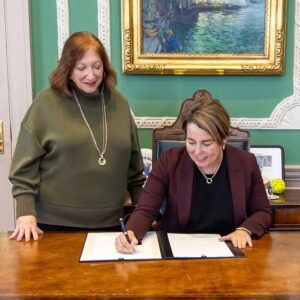
On Jan 9, 2025, Massachusetts Governor Maura Healey signed legislation to rename the Executive Office of Elder Affairs to the Executive Office of Aging & Independence to better represent and reflect the values of older adults in Massachusetts. Renaming the agency reduces negative images around aging, normalizes aging as a natural process, and recognizes that older adults value independence and self-determination, while emphasizing that the Healey-Driscoll Administration is here to support residents as they age.
“Our population of adults aged 60+ continues to grow, and it is essential that we evolve to meet the changing needs of this group,” said Governor Maura Healey. “We want residents to feel reflected in our agencies and to know where to turn when they need support. I’m grateful to the Legislature for advancing this bill, and I look forward to seeing the work that our incredible team at the Executive Office of Aging & Independence will do for the people of Massachusetts.”
“We are proud to be at forefront of meeting the changing needs of older adults and seek to be a model for others in the nation,” said Lieutenant Governor Kim Driscoll. “Massachusetts and the Executive Office of Aging & Independence are dedicated to supporting residents of all ages to live and thrive through the aging process.”
Governor Healey proposed the name change in May. The new name was selected following significant research that included focus groups, surveys, and conversations with older adults, caregivers, service providers, and advocacy organizations. This research revealed that aging adults do not connect with the term “elder,” and often associate the term with someone who is at the end of their life. Instead, residents prefer neutral terms such as “aging” and “older people.”
“Massachusetts is a leader in age-friendly practices; we were one of the first states to achieve AARP’s age-friendly designation,” said Health and Human Services Secretary Kate Walsh. “The agency name change reflects the Healey-Driscoll Administration’s work to make Massachusetts a great place to live at any age.”
“We are all aging. Growing older is not one agency’s focus. Across the Administration, policies and programs impact our older population,” said Aging & Independence Secretary Robin Lipson. “We are excited to work across the Administration to make Massachusetts a better place for residents of all ages to grow up and grow older, together.”
“Renaming the Executive Office of Elder Affairs to the Executive Office of Aging & Independence not only demonstrates the Commonwealth’s commitment to serving our older adults but reflects that we are serious about addressing ageism in the state,” said Representative Thomas M. Stanley (D-Waltham). “As the aging population grows in Massachusetts, we must redefine what it means to advance in age and celebrate the benefits of achieving longevity. I’m grateful to the Healey-Driscoll Administration, including Secretary Lipson and her team, for championing this change and look forward to the important work ahead for the new Executive Office of Aging & Independence.”
“We’re all aging, and it’s good to have the office name reflect people’s desire to live with as much independence and dignity as possible,” said Senator Patricia Jehlen (D-Middlesex).
In addition, the name change legislation replaces outdated language across state statutes, such as “elder,” “elderly person(s),” and “handicapped” with “older adult(s)” and “adult with a disability.”
Massachusetts Media Contact: Karissa Hand, Press Secretary
